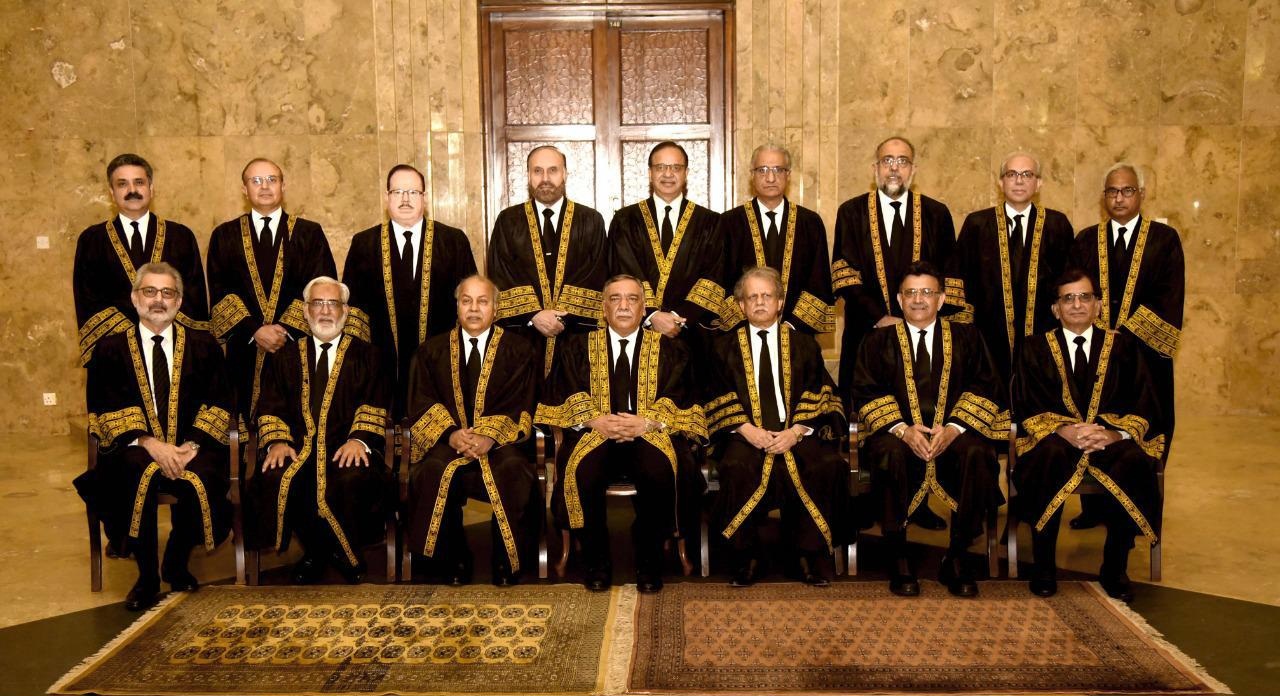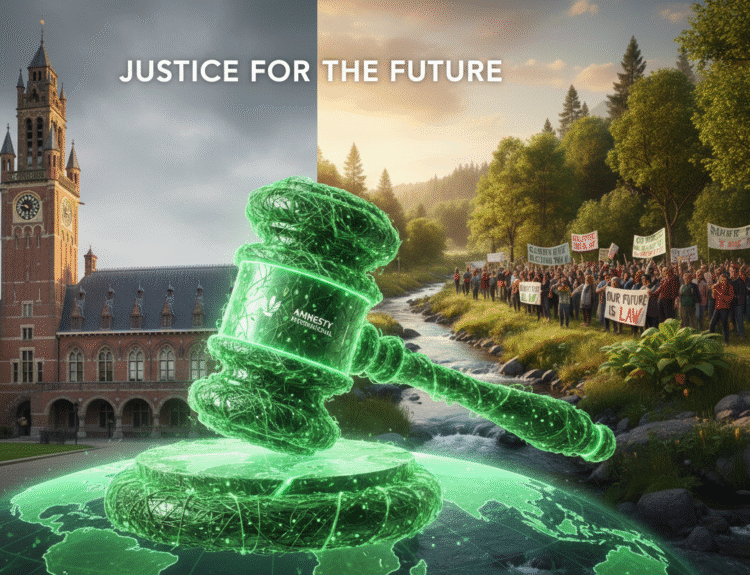While addressing to a full court reference on retirement of Justice Sheikh Azmat Saeed on Tuesday Chief Justice Asif Saeed Khan Khosa expressed he always benefitted from Justice Sheikh’s intellect and rich experience.
“Sheikh Sahib has always carried with him all aspects of proper judicial conduct, be it fairness, open-mindedness, courage, firmness, punctuality, courtesy, understanding and compassion”, said Justice Khosa.
Attorney General for Pakistan Anwar Mansoor, Supreme Court Bar Association President Amanullah Kanrani and Syed Amjad Shah, Vice Chairman Pakistan Bar Council addressed the full court reference and paid rich tributes to Justice Sheikh Azamat Saeed on the occassion.
Addressing the full court reference, the outgoing judge of the Supreme Court, Justice Sheikh Azmat Saeed expressed that no individual was bigger than the institution saying that his brother judges in the top court were keenly aware of their duty to preserve, protect and defend the Constitution.
Justice Sheikh said, “No doubt, institutions are peopled with individuals but no individual is bigger or more important than the institution. No one is indispensable nor am I”.
“I can state without fear of contradiction that I am leaving this court in the safe and steady hands of my learned brother judges, who are keenly aware of their duty to preserve, protect and defend the Constitution,” he said. “I assure you, no matter, what the circumstances, my brother judges shall do the right thing, in the right manner, at the right time without fear or favour, affection or ill-will.”
Justice Saeed expressed, “our legal system has evolved and developed brick by brick, judgment by judgment”, saying this legal journey “will go on and will not be short circuited through short-cuts”.
He said that divergence of opinion in respect of the understanding but not misunderstanding of the law is a blessing and stressed: “My brother judges are also fully cognizant of the difference between “judicial individualism” and “judicial anarchy.”
Justice Sheikh described the practicing advocates as an integral and essential part of the legal system saying the judges were aware that any effort to delete or dilute their role would disfigure the system beyond recognition.
“I leave this court in the protection of the bar, whose members are sensitive to the fact that their role, relevance and respect is a reflection of the role, relevance and respect of this court and, therefore, will never allow the dignity of this court and thus of the bar to be compromised”, said Justice Sheikh.
Justice Sheikh expressed, “It is an independent bar, which in the ultimate is the guarantor of an independent judiciary, therefore, I am equally confident that the bar will continue to insulate itself from outside influences.”
Justice Sheikh Azmat Saeed also dilated on the important role of the Supreme Court registrar and the subordinate staff in the dispensation of Justice in the country. “The functioning of this court would not be possible without the staff led by the registrar who man our offices,” he concluded.
Addressing the reference, Chief Justice Sardar Asif Saeed Khan Khosa said, “Honourable Justice Sheikh Azmat Saeed has been an enormous asset to the superior judiciary throughout his time on the Bench and I have always benefitted from his intellect and rich experience. Sheikh Sahib has always carried with him all aspects of proper judicial conduct, be it fairness, open-mindedness, courage, firmness, punctuality, courtesy, understanding and compassion”.
Chief Justice expressed that during his time at the Supreme Court, Sheikh Sahib has rendered many landmark judgments and settled many uncertain issues. His faithfulness to constitutionalism and rule of law has been a hallmark of his judgments and his adherence to law and law alone is writ large in his opinions.
Dealing with the question of limitations on the power of the Parliament to amend the Constitution his lordship held in the case of District Bar Association, Rawalpindi and others v Federation of Pakistan and others (PLD 2015 SC 401) as follows:
“A bird’s eye view of the Constitution reveals that it is self evident that Pakistan is a Democracy with the ultimate sovereignty vesting in Almighty Allah and delegated to the people of Pakistan (and not to any individual or group of persons who may seize power by force of arms).
It has a Parliamentary form of Government. The Fundamental Rights are guaranteed to all Citizens, including minorities. There is a Trichotomy of Power with a judiciary with its independence fully secured. Rule of Law, Equality and Social & Economic Justice are embodied in no uncertain terms. The aforesaid are the prominent characteristics which define our Constitution.”
Sheikh Sahib’s ability to grasp and comprehend complex points in a matter of seconds and his lordship’s skill of reducing intricate and complicated points of law to simple propositions are only a few of his many qualities that make Sheikh Sahib such an excellent Judge.
Sheikh Sahib’s approach in deciding cases was clear and straightforward and young Judges would do better if they heed to what Sheikh Sahib had observed in the case of Malik Shakeel Awan v Sheikh Rasheed Ahmed and 21 others (Civil Appeal No. 467 OF 2015). In that case of an election dispute his lordship had observed that:
“This Court, for that matter any court, seized of a lis is required to decide the same rather than to embark upon an academic exercise. We cannot shy away from adjudicating upon the lis that comes before the Court without attempting to ascertain and identify the principles of law as developed through the interpretative process of the previous judgments of this Court and apply the same to the facts of the case.”
Sheikh Sahib’s capacity to understand a proposition with the speed of light, his razor-sharp wit and a penetrating but endearing sense of humour have been found by me to be indomitable features of his personality. I am sure that everyone present here must have had the pleasure of coming into contact with these qualities of Sheikh Sahib and I, for one, shall dearly miss them after his lordship’s departure from the Bench.
Chief Justice concluded, “In the end, with fondest of memories and with every good wish I on my own behalf and also on behalf of all my colleagues bid farewell to our very dear friend and illustrious colleague Mr. Justice Sheikh Azmat Saeed. Sir, we shall all miss you on the Bench but at the same time all of us pray for your good health, long life and further fruitful contributions in diverse walks of life in the days to come. May Almighty Allah bless you and your family. A’meen”.
Addressing the reference, PBC Vice Chairman Syed Amjad Shah urged the Supreme Court to play its constitutional role for the protection of the fundamental rights of the people. He said there was suffocation in the prevailing situation, where departments concerned were using every tactic to suppress the voice of dissent.
“Whether different departments should be allowed to act beyond their limits and interfere in affairs of other state institutions. Whether the Supreme Court is successfully playing its role in this regard,” Shah said.
He also questioned whether the judiciary and parliament were working independently. He said that efforts were being made to suppress every dissent voice and people are being indulged in false cases and that they were being deprived in their basic rights.
Shah stated that it was the demand of the lawyers that the Supreme Court should set its parameters to exercise its jurisdiction under Article 184 (3) of Constitution and the aggrieved party should also be given right of appeal before a larger bench.
He also said that lawyers had reservations over the process of appointment of judges and called for make decision of all references public. He urged that the full court should hear the constitutional petition filed by Justice Qazi Faez Isa and different bars against the presidential reference.
He stated that lawyers had already expressed reservations over the Supreme Judicial Council proceedings against Justice Isa and Justice K K Agha. Lawyers have already started countrywide movement against the presidential reference against both judges.





